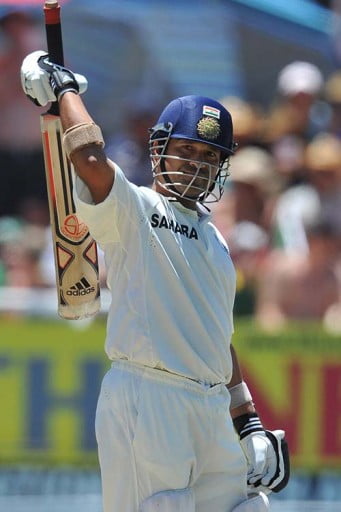 Ernest Hemingway called ‘retirement’ the ugliest word in the language. Bill Shankly compared it with a walk to the electric chair. On Thursday afternoon, as he pondered an existence removed from what he has known for the past three decades, Sachin Tendulkar said, “It’s hard for me to imagine a life without playing cricket because it’s all I have ever done since I was 11 years old.”
Ernest Hemingway called ‘retirement’ the ugliest word in the language. Bill Shankly compared it with a walk to the electric chair. On Thursday afternoon, as he pondered an existence removed from what he has known for the past three decades, Sachin Tendulkar said, “It’s hard for me to imagine a life without playing cricket because it’s all I have ever done since I was 11 years old.”
Some of us had known for a while that a South African farewell was unlikely. Long before the unseemly disagreements between the two boards and the shoehorning in of a home series against West Indies, the writing was legible on a wall that had seen better days. As much as his own lack of form over the past home season, Tendulkar would have been conscious of how many of his brothers-in-arms had either moved on or been left behind. In every sense, he had become the last man standing.
The timing is right. Forget the nonsense you read about the Mumbai Indians’ Champions League Twenty20 win providing a fairytale ending. Tendulkar didn’t grow up dreaming of glory in franchise cricket. That, like the IPL win earlier in the year, was just an autumnal bonus. For him, like for every other cricketer of his generation, playing for the country was what mattered most. That national cap, and what you did while wearing it, was the ultimate yardstick.
During the first season of the IPL, Rahul Dravid spoke to me of priorities and how they affect the memory. He admitted that he’d probably struggle to remember too many of his Twenty20 innings, before adding: “I doubt I’ll have any difficulty recalling the memorable Test knocks.”
Tendulkar’s memory, when it came to the games he had played, was beyond formidable. I remember an interview in 2006, when he basically talked me through an entire spell that Mohammad Asif had bowled to him in a One-Day International in Lahore. He didn’t just recall the strokes he played. He emphasised the ones he didn’t, the deliveries that had to be left alone because they were simply too good to take liberties with.
It was the same reason why, a few years earlier, he had nominated an ODI innings of 44 in Trinidad as one of his finest. It didn’t matter to him that he hadn’t crossed any milestones. What mattered, he said, was how he’d felt that day, how the ball had sped off the bat, against bowling of searing pace and quality.
If and when India do assemble in Cape Town for a Test match in early 2014, there will scarcely be anyone at Newlands whose mind doesn’t rewind three years, to a contest within a contest that was as good as anything cricket has ever seen. Dale Steyn was rampant, with the wicked swing that trapped Cheteshwar Pujara indicative of both his pace and mastery. Gautam Gambhir was the epitome of defiance at one end. At the other, Tendulkar had more than resistance on his mind.
He struck 17 fours and two sixes, but it was the manner in which he kept Steyn out that made the innings unforgettable. Of the 83 deliveries he faced from Steyn, 72 were dot balls. Occasionally, he would play and miss. There were edges too, off both sides of the bat, which fell kindly. But for the most part, he left impeccably or rode the bounce perfectly to drop the ball down at his feet. He had played an innings of similar quality in Perth 19 years and half a life earlier, and it was nothing short of incredible that the passage of time had dimmed neither the brilliance of his strokeplay nor his desire to test himself against the very best.
It was that desire that kept him coming back season after season. The records long ago ceased to matter. Several of them are forever out of reach, like Sir Donald Bradman’s batting average. What he craved was the adrenaline rush of the contest, whether against Warne or Asif or Steyn.
Two-thirds of India’s population is too young to even remember a cricket world without Tendulkar. Reality will really bite hard when India play their first Test without him, whether that’s in South Africa or New Zealand. When the second wicket falls, there’ll be that familiar frisson of anticipation, that waiting for the buzz in the crowd to reach a crescendo. Then, you’ll slowly realise that it’s not the familiar figure striding out, but someone else. That’s when it will hit you, like an uppercut to the chin.
We will only ever be able to speculate about this, but how will Tendulkar feel when it happens? Will he even be watching? And if he is, what emotions will hurtle through his mind? Regret? Relief? Pride? Sadness? Where does a warrior go when he downs his weapons and walks away?
“I hate to quit,” said Johnny Unitas, greatest of American Football quarterbacks, after he retired with pretty much every record in the game. “I’d like to play for another 30 years. Your mind is willing, but your body wears out … it would be foolish for me to try to do things I once tried to do.”
Tendulkar has come to the same conclusion. Now, it’s up to the rest of us to make peace with it.
Article sourced from: wisdenindia.com. http://www.wisdenindia.com/cricket-blog/warriors-go/80492
































